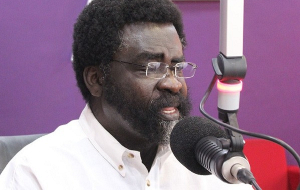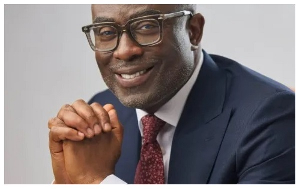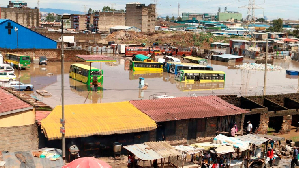Opinions of Thursday, 1 March 2007
Columnist: Fredua-Kwarteng, Y.
Re: Ghana Independence Celebrations: What are the Justifications?
My article titled “Ghana Independence Celebrations: Where are the Justifications?” that was published February 4, 2007 drew a variety of commentaries and criticisms. The central thesis of my article is that Ghanaians have failed to carry on the responsibilities entailed in independence and for that reason it is meaningless to celebrate our independence. The critical question is what are you celebrating? What are our achievements? Is Ghana really independent politically and economically? My point is that while independence is a window of opportunity, it is also an enormous responsibility to make conditions of life better than under colonial rule. At a periodic juncture of our nationhood, Ghanaians have to ask themselves whether their nation-state has shouldered its independence responsibilities properly. This self-criticism is hardly undertaken in Ghana and what I usually observe is a mass craze toward celebratory independence activities.
Mr. Rodney Nkrumah-Boateng is one of the leading proponents of independence celebrations who wrote a pretty lengthy rejoinder to my article on February 11, 2007. He characterizes me as a prophet of doom and accuses me of deifying Kwame Nkrumah, Ghana’s president. According to the writer Ghana has achieved so much that calls for nothing but celebrations. Yet he wrote…”The standards of education and health as they stand now in Ghana can never be deemed to be acceptable. Too many of our countrymen live in fifth and squalor, condemned to a lifetime of poverty and deprivation, living as outsiders in their own country and having no stake in it. Our country suffers from systemic corruption and our political structures need strengthening”. As if this catalogue of problems are not enough to convince the writer of the hollowness of our independence – our persistent failure to live up to the responsibilities wrought by independence—the writer chooses to call them problems and challenges of development. And instead of saying there is a great deal of work to do if we are to achieve our full independence he wrote, “. There is a great deal of work to do if we are to achieve our full potential.” This is a cleaver way to use language to conceal realities. Indeed I regard this as unnecessary semantics and a futile attempt to maintain optimism in spite of grim realities that persist in our dear country.
Mr. Nkrumah-Boateng likened Ghana’s development to a toddler, who is learning to adapt his/her feet to the ground—to walk, stand, jump, run. However, he fails to indicate when Ghana will graduate from toddlerhood and enter its teen period, so to speak. Does Ghana also need fifty years for its teenage period? In other words, does Ghana need another fifty years before it can provide its citizens with basic drinking water, healthy sanitation, and eliminate adult illiteracy? I reject this time-marking oriented concept of development which has become so ingrained in the uncritical consciousness of a majority of Ghanaians and our leaders. For instance, to reform secondary education in Ghana our political leaders have proposed to increase its duration by one more year in the false belief that there is a positive correlation between duration of secondary education and academic achievement. Our incompetent political leaders also use the time-oriented concept of development to conceal their ineptitude to put Ghana on an appropriate path to political and economic development. As one of our political leaders said to me sometime ago, “Ghana is a young country and you are demanding too much… Yet other nation-states that become independent long after Ghana’s independence have been able to chalk remarkable achievements. For example, Botswana became independent from Britain in 1966, and according to the World Bank statistics Botswana’s income per capita is estimated to be $11,410 in 2005 compared to $ 2,643 for Ghana. Botswana also has adult literacy of 79% compared to 74% for Ghana. Gross enrolment for primary, secondary and tertiary schools is 70% for Botswana and 46% for Ghana. As well, Botswana scored 5.9 points on the 2005 international Corruption Perception Index (CPI) compared to Ghana’s 3.5 points. This suggests the widespread of corruption in Ghana’s public sector.
Another example is Singapore that obtained its independence from Britain in 1965 -- eight years after Ghana attained her independence. According to the World Bank statistics in 2005, Singapore had an income per capita of $ 28,530, adult literacy of 93% and primary, secondary and tertiary enrolment of 87%. Further, the Asian Economic Tigers—South Korea, Taiwan, Singapore, and Hong Kong-- used relatively shorter period to achieve their economic growth rates and industrialization compared to older countries such as Spain and Portugal, which had unrestricted access to the huge resources of their colonies. The point I am trying to make is that we must not use age of our nationhood to determine how much progress we should be making. The best criterion for measuring our progress, in my critical opinion, is to compare ourselves to nation-states that attained their independence either at the same time as we attained ours or after we attained ours.
In my article I argued that Ghana could have done better in its inter-ethnic relationships and that the existence of “zongos” in southern cities is a testament of lack of ethnic integration in Ghana. I labeled “zongos” as apartheid in the metaphorical sense of the word in that a huge chuck of the residents in zongos are people of northern extraction. While Mr. Nkrumah—Boateng acknowledges that zongos are normally populated by Northerners he dismisses ethnicity as a factor in this pattern of settlement. And he states that “social movement patterns studies establish that whenever people of a different ethnicity or race move into a different place, they tend to group together and thereby create enclaves for themselves”. He refers to Harlem in New York, Brixton in London, and Fante New Town in Kumasi as empirical demonstrations of the truth of his theory of patterns of settlement. However, his theory of patterns of settlement is merely descriptive sociology, belonging to the positivistic tradition rather than the critical school.
The critical school regards very social phenomenon as socially constructed rather than the “act of God”. Thus, critical sociologists ask questions like these: Why do these patterns of settlement manifest in certain situations but not in others? What is the general receptivity in the whole country of the population group that lives in segregated neigbourhoods? Who stands to benefit politically or symbolically from these patterns of settlement? Indeed, patterns of population settlement are a complex social phenomenon that can not be explained adequately by Mr. Nkrumah-Boateng’s simplistic, incoherent theory. To illustrate, Akan tribalism against Northerners is the key factor that historically led to the creation of Zongos in Kumasi, not poverty. Poverty is a secondary factor when the creation of zongos is cast in a critical historic perspective. For example, sociologically not all poor migrant workers in Kumasi live in zongo. If the only proper residential neighbourhood for a poor Northerner migrant in Southern cities is zongo, then I see an intersection between ethnicity and poverty as a prime factor responsible for the creation of zongos in Southern cities.
Again, Fante New Town neighbourhood in Kumasi is merely a historical name reminding us that the early settlers were Fantes. Fantes in that neighbourhood do not make up the dominant population group. Furthermore, if Mr. Nkrumah-Boateng’s theory of patterns of settlement holds any water, why is that when southerners move to settle in Northern Ghana they do not congregate in one place and establish a parallel zongo? Why it is that Asantes or Akans did not establish a similar residential pattern based on ethnicity when they migrated to Accra? In the case of Harlem in New York, American institutionalized racism rather than poverty is responsible for the creation of that hood, since majority of the residents are people of African descent. Historically, racial discrimination in housing and employment against African Americans created an intersection between race and poverty in Harlem. In fact, Harlem is a living example of how White social policy is adept at creating residential warehouses for Blacks in the United States. Instead of acknowledging tribalism against Northerners and join the social movement of critical Ghanaians committed to creating an integrated society, Mr. Nkrumah-Boateng dismisses my cry of tribalism. And he offers the traditional cliché “Even the tongue and teeth clash sometimes” to justify the existence of tribal tension in Ghana. I reject Mr. Nkrumah-Boateng’s theory of settlement patterns and clichés and call for a strong social policy to eliminate zongos in Ghana. Zongos are national eyes sores that more or less indirectly justify White racism against people of African descent. This is where I find the social policy of Arthur Kennedy, the NPP presidential aspirant, distinctively effective-- to create an integrated society based on nationality rather than ethnicity; where government will take proactive measures to forge national unity emphasizing our inherent commonalities, not our dissimilarities.
Further, Mr. Nkrumah-Boateng gives a catalogue of our achievements that justifies the celebration of independence. He states that we have moved from dictatorship to military regimes, to a stable political democracy whose features consist of multi-party democracy, robust free press, independent judiciary, and vibrant opposition. He goes on to say that relative to other countries in the sub-region Ghana has steered off civil war and violence that have almost destroyed other countries in the region. At the conclusion of his narrative, he did not explain why Ghana has remained politically stable in contradistinction to other countries. The relative peace that Ghana enjoys can not be attributed to the political initiatives of any of the post-Nkrumah’s governments. On the contrary, Nkrumah’s social policy of building an integrated society such as naming three Northerners to his first cabinet and the institution of free-education for Northerners gave them a sense of being part of Ghana. This is in contrast to Ivory Coast, for example, where the Northern social group, has been denied social opportunities such as education since independence from France. Again, in Liberia descendants of free slaves from the United States monopolized the political institutions and amassed tremendous wealth while the indigenous population lived in squalid without any access to social opportunities.
Moreover, Mr. Nkrumah-Boateng seems to have limited knowledge about the role of IMF and the World Bank in Ghanaian democratic political dispensation. Rawlings did not out of his own violation decide to allow multi-party democracy to flourish in Ghana. It was all due to the enormous pressure from the IMF and the World Bank that Ghanaians are enjoying the present democracy. So I can not call Ghana’s democratic experiment an achievement. Any model of social change that are constructed by Euro-American institutions and imposed on us can not be construed as our own achievement. On the other hand, any change constructed endogenously by Ghanaians and their leaders and successfully implemented can be labeled a Ghanaian achievement and it is justified to celebrate it. Since Nkrumah was overthrown, I do not know of any Ghanaian leader who has demonstrated any vision or independent thinking to do anything substantive or creative in Ghana without being asked to do so by the neo-colonial institutions—IMF and the World Bank. This is one of the reasons I believe we have not lived up to our independence obligations, and therefore, we do not have any moral reasons to celebrate it on the scale that has been planned. Mr. Nkrumah-Boateng and his cohort of independence celebrators have not convinced me a bit about why celebrating Ghana’s independence is justified. After all, every past government, even military ones with undemocratic structures, organized celebration of our independence. The desire of governments to celebrate rather than remember our independence is an obsessive, compulsive behaviour without any deep-thinking or reflections. If it is not a neurosis, then it is a great occasion for members of the Ghanaian political establishment to indulge in pleasurable jamboree and to make money through various corrupt schemes.
Furthermore, Mr. Nkrumah-Boateng does not see any anything wrong with our leaders’ persistent begging around the world. He argues that it is how we use the resources we get from begging that matters most rather than the act of begging itself. But history has persistently shown that we have not been able to utilize resources we get from begging either because the begged resources are stolen by our political leaders or our leaders do not have any plans to utilize the begged resources efficiently. So for how long can we continue to beg? Mr. Nkrumah-Boateng misquoted me as saying we should appoint minister for begging. On the contrary, it is the institutionalized culture of begging that led me to say that very soon minister for begging may be appointed. It was my comical way of saying that the begging is becoming too much our way of life and it is unacceptable. Mr. Nkrumah-Boateng also goes on to cite Germany as one of the countries in Europe that benefited from the American engineered Marshall Plan. Certainly, several European countries benefited from that plan as the Second World War had rendered their economies almost bankrupt. However, there are apparent differences between Ghana’s situation and that of Germany. Germany was devastated by war; Ghana was not. Ghana’s economy is instead devastated by years of mismanagement. Second, Germany did not go around the globe begging for economic rescue. Third, the terms and conditions of the Marshall Plan are different from those of the IMF and World Bank structure adjustment plan. The structural adjustment plan places the management of Ghana’s economy in the hands of IMF and the World Bank.
That said, we should bear in mind that the West always buys political influence in non-Western politics with money. That is, the West does not give away any thing free-of-charge to Ghana or any African country. So I was very surprised when Dr. Nduom stated that the “Millennium Challenge Account (MCA),” by which the U.S. has set $547 million for Ghana, has no conditions attached to it and that it is a grant for good governance, to encourage other countries to do more for their people. Why should the U.S give the Ghanaian government a cash reward for good governance? Is the U.S. a father-Christmas that rewards governments around the globe for excellence in governance? Dr. Nduom’s thinking is so simplistic and puerile that I don’t think that such a mentality is suitable for running Ghana. Unfortunately, such mentality is prevalent among African political leaders and it has compromised independence of African countries.
In response to my article under discussion, one Ghanaian suggested that I read basic economics in order to understand why importing frozen chicken legs, salty pork feet, and fatty turkey tails is a good thing for Ghana. She justified such importations on the grounds of international and free trade, one of the dominant ideologies that permeate the field of bourgeois economics. Nevertheless, is the production of chicken legs, salty pork feet, and fatty turkey tails so difficult to undertake internally? If after fifty years of independence we can not produce these items ourselves for local consumption, then what kind of economy are we building in Ghana? If free trade is that good why is the West closing its markets to African agricultural produce? Why is the Bush administration erecting protective barriers for U.S. farmers? In fact, free trade like other ideologies propagated in mainstream economics textbooks is a raw idea that must be critically interrogated and filtered using our own values and rationality.
To conclude this piece, what I suggested in my article was that our independence should be remembered and not celebrated. Remembering our independence involves making the occasion a time for deep national reflection, to remember the noble intentions of the doyens of independence, and to chart a new path for national reconstruction.
Opinions












